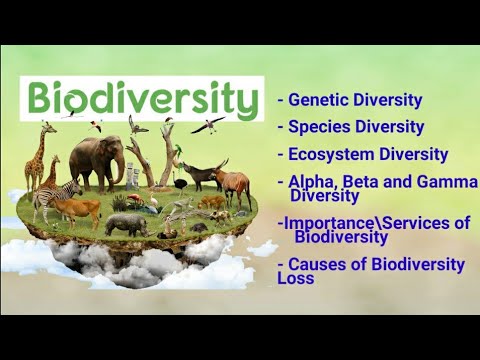biodiversity, short for biological diversity, refers to the variety and variability of life on Earth. It encompasses the sheer number of different species of plants, animals, and microorganisms found in various habitats, as well as the diversity within each species. biodiversity plays a crucial role in maintaining the balance and functioning of ecosystems, providing invaluable services upon which all life depends.
The concept of biodiversity is often measured at three different levels: genetic diversity, species diversity, and ecosystem diversity. Genetic diversity refers to the variety of genes within a particular species or population. The more diverse the genes are within a population, the better its chances are to adapt and survive changes in its environment.
Species diversity refers to the number and abundance of different species present in a given area. Each species has its own unique set of characteristics that allow it to fulfill specific roles within an ecosystem. The loss of even one species can have profound effects on the entire ecosystem.
Ecosystem diversity relates to the variety of ecosystems or habitats found within a region or on the planet as a whole. Ecosystems range from tropical rainforests to coral reefs, deserts to wetlands; each with its own distinct set of plant and animal communities that have formed over thousands or even millions of years.
Why is biodiversity important? biodiversity provides numerous benefits that are essential for human existence and well-being. First and foremost, it ensures the stability and resilience of ecosystems. A diverse ecosystem is much more capable of resisting disturbances such as climate change or natural disasters—ensuring that they can continue providing clean air, fresh water, soil fertility, food sources, medicines, and climate regulation services.
biodiversity also plays a significant role in improving human health by offering potential remedies for various diseases. Many pharmaceutical drugs have been derived from natural sources found in diverse ecosystems around the world. Our reliance on effective treatments for illnesses further emphasizes how vital biodiversity is to maintaining human well-being.
Furthermore, biodiversity has aesthetic and cultural value. The diverse array of ecosystems and species contribute to the beauty of our planet and are a source of inspiration for art, music, literature, and various cultural practices. Preserving biodiversity ensures that future generations will be able to enjoy the wonders of the natural world that have captivated and enriched human civilizations for centuries.
Unfortunately, human activities increasingly threaten biodiversity. Habitat destruction, climate change, overexploitation of resources, pollution, and invasive species are just some of the many factors contributing to the rapid decline of species worldwide. According to the 2020 Global biodiversity Outlook report by the United Nations, around one million species are at risk of extinction if we do not take immediate action.
Preserving biodiversity requires a multi-faceted approach. Conservation efforts must focus on protecting habitats through implementing effective land-use planning policies, creating protected areas and wildlife reserves, restoring degraded ecosystems, and promoting sustainable agricultural practices. Additionally, raising awareness about the importance of biodiversity and its irreplaceable value in sustaining life on Earth is crucial in garnering support for conservation efforts.
In conclusion, biodiversity is vital for sustaining life on Earth. The intricate web of relationships between species ensures ecological balance and provides numerous benefits essential for human survival. Protecting and preserving our planet’s incredible diversity by taking immediate action is not only a moral obligation but also an investment in our own well-being and that of future generations.





